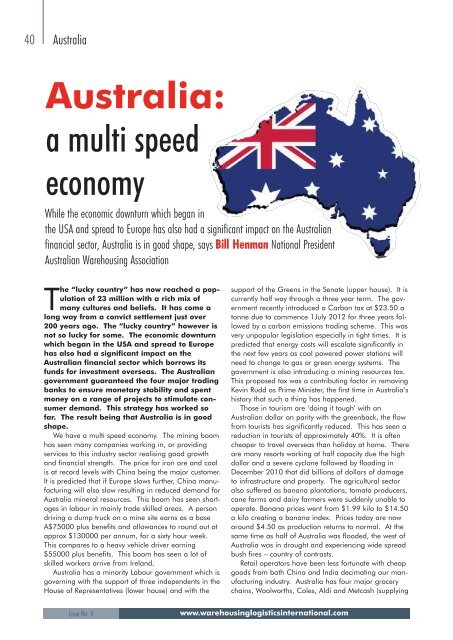ifwla - Warehousing and Logistics International
ifwla - Warehousing and Logistics International
ifwla - Warehousing and Logistics International
You also want an ePaper? Increase the reach of your titles
YUMPU automatically turns print PDFs into web optimized ePapers that Google loves.
40 Australia<br />
Australia:<br />
a multi speed<br />
economy<br />
While the economic downturn which began in<br />
the USA <strong>and</strong> spread to Europe has also had a significant impact on the Australian<br />
financial sector, Australia is in good shape, says Bill Henman National President<br />
Australian <strong>Warehousing</strong> Association<br />
The “lucky country” has now reached a population<br />
of 23 million with a rich mix of<br />
many cultures <strong>and</strong> beliefs. It has come a<br />
long way from a convict settlement just over<br />
200 years ago. The “lucky country” however is<br />
not so lucky for some. The economic downturn<br />
which began in the USA <strong>and</strong> spread to Europe<br />
has also had a significant impact on the<br />
Australian financial sector which borrows its<br />
funds for investment overseas. The Australian<br />
government guaranteed the four major trading<br />
banks to ensure monetary stability <strong>and</strong> spent<br />
money on a range of projects to stimulate consumer<br />
dem<strong>and</strong>. This strategy has worked so<br />
far. The result being that Australia is in good<br />
shape.<br />
We have a multi speed economy. The mining boom<br />
has seen many companies working in, or providing<br />
services to this industry sector realising good growth<br />
<strong>and</strong> financial strength. The price for iron ore <strong>and</strong> coal<br />
is at record levels with China being the major customer.<br />
It is predicted that if Europe slows further, China manufacturing<br />
will also slow resulting in reduced dem<strong>and</strong> for<br />
Australia mineral resources. This boom has seen shortages<br />
in labour in mainly trade skilled areas. A person<br />
driving a dump truck on a mine site earns as a base<br />
A$75000 plus benefits <strong>and</strong> allowances to round out at<br />
approx $130000 per annum, for a sixty hour week.<br />
This compares to a heavy vehicle driver earning<br />
$55000 plus benefits. This boom has seen a lot of<br />
skilled workers arrive from Irel<strong>and</strong>.<br />
Australia has a minority Labour government which is<br />
governing with the support of three independents in the<br />
House of Representatives (lower house) <strong>and</strong> with the<br />
Issue No. 3<br />
support of the Greens in the Senate (upper house). It is<br />
currently half way through a three year term. The government<br />
recently introduced a Carbon tax at $23.50 a<br />
tonne due to commence 1July 2012 for three years followed<br />
by a carbon emissions trading scheme. This was<br />
very unpopular legislation especially in tight times. It is<br />
predicted that energy costs will escalate significantly in<br />
the next few years as coal powered power stations will<br />
need to change to gas or green energy systems. The<br />
government is also introducing a mining resources tax.<br />
This proposed tax was a contributing factor in removing<br />
Kevin Rudd as Prime Minister, the first time in Australia’s<br />
history that such a thing has happened.<br />
Those in tourism are ‘doing it tough’ with an<br />
Australian dollar on parity with the greenback, the flow<br />
from tourists has significantly reduced. This has seen a<br />
reduction in tourists of approximately 40%. It is often<br />
cheaper to travel overseas than holiday at home. There<br />
are many resorts working at half capacity due the high<br />
dollar <strong>and</strong> a severe cyclone followed by flooding in<br />
December 2010 that did billions of dollars of damage<br />
to infrastructure <strong>and</strong> property. The agricultural sector<br />
also suffered as banana plantations, tomato producers,<br />
cane farms <strong>and</strong> dairy farmers were suddenly unable to<br />
operate. Banana prices went from $1.99 kilo to $14.50<br />
a kilo creating a banana index. Prices today are now<br />
around $4.50 as production returns to normal. At the<br />
same time as half of Australia was flooded, the west of<br />
Australia was in drought <strong>and</strong> experiencing wide spread<br />
bush fires – country of contrasts.<br />
Retail operators have been less fortunate with cheap<br />
goods from both China <strong>and</strong> India decimating our manufacturing<br />
industry. Australia has four major grocery<br />
chains, Woolworths, Coles, Aldi <strong>and</strong> Metcash (supplying<br />
www.warehousinglogisticsinternational.com



